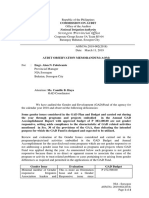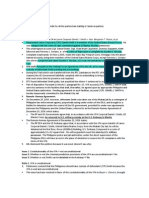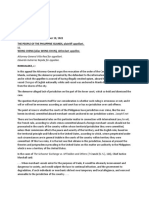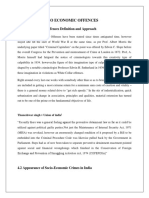0 ratings0% found this document useful (0 votes)
41 viewsSUZETTE NICOLAS VS. ROMULO, February 11, 2009
SUZETTE NICOLAS VS. ROMULO, February 11, 2009
Uploaded by
Nandie Joy1. Lance Corporal Daniel Smith, a US Marine, was convicted of raping Suzette Nicolas, a Filipina. Under the Visiting Forces Agreement (VFA) between the Philippines and US, Smith was to be detained in facilities agreed upon by both countries, with detention "by Philippine authorities."
2. However, Smith was transferred to a US embassy detention facility under the Romulo-Kenney Agreements, signed after his conviction. Petitioners argued this violated the equal protection clause.
3. The court found no equal protection violation, as different rules can apply to foreign forces by agreement. However, the Romulo-Kenney Agreements were found to violate the VFA, which
Copyright:
© All Rights Reserved
Available Formats
Download as DOCX, PDF, TXT or read online from Scribd
SUZETTE NICOLAS VS. ROMULO, February 11, 2009
SUZETTE NICOLAS VS. ROMULO, February 11, 2009
Uploaded by
Nandie Joy0 ratings0% found this document useful (0 votes)
41 views2 pages1. Lance Corporal Daniel Smith, a US Marine, was convicted of raping Suzette Nicolas, a Filipina. Under the Visiting Forces Agreement (VFA) between the Philippines and US, Smith was to be detained in facilities agreed upon by both countries, with detention "by Philippine authorities."
2. However, Smith was transferred to a US embassy detention facility under the Romulo-Kenney Agreements, signed after his conviction. Petitioners argued this violated the equal protection clause.
3. The court found no equal protection violation, as different rules can apply to foreign forces by agreement. However, the Romulo-Kenney Agreements were found to violate the VFA, which
Original Description:
s
Original Title
Suzette
Copyright
© © All Rights Reserved
Available Formats
DOCX, PDF, TXT or read online from Scribd
Share this document
Did you find this document useful?
Is this content inappropriate?
1. Lance Corporal Daniel Smith, a US Marine, was convicted of raping Suzette Nicolas, a Filipina. Under the Visiting Forces Agreement (VFA) between the Philippines and US, Smith was to be detained in facilities agreed upon by both countries, with detention "by Philippine authorities."
2. However, Smith was transferred to a US embassy detention facility under the Romulo-Kenney Agreements, signed after his conviction. Petitioners argued this violated the equal protection clause.
3. The court found no equal protection violation, as different rules can apply to foreign forces by agreement. However, the Romulo-Kenney Agreements were found to violate the VFA, which
Copyright:
© All Rights Reserved
Available Formats
Download as DOCX, PDF, TXT or read online from Scribd
Download as docx, pdf, or txt
0 ratings0% found this document useful (0 votes)
41 views2 pagesSUZETTE NICOLAS VS. ROMULO, February 11, 2009
SUZETTE NICOLAS VS. ROMULO, February 11, 2009
Uploaded by
Nandie Joy1. Lance Corporal Daniel Smith, a US Marine, was convicted of raping Suzette Nicolas, a Filipina. Under the Visiting Forces Agreement (VFA) between the Philippines and US, Smith was to be detained in facilities agreed upon by both countries, with detention "by Philippine authorities."
2. However, Smith was transferred to a US embassy detention facility under the Romulo-Kenney Agreements, signed after his conviction. Petitioners argued this violated the equal protection clause.
3. The court found no equal protection violation, as different rules can apply to foreign forces by agreement. However, the Romulo-Kenney Agreements were found to violate the VFA, which
Copyright:
© All Rights Reserved
Available Formats
Download as DOCX, PDF, TXT or read online from Scribd
Download as docx, pdf, or txt
You are on page 1of 2
2. SUZETTE NICOLAS VS.
ROMULO, February 11, 2009
Facts:
Herein respondent, Lance Corporal Daniel Smith, is a member of the United States
Armed Forces. He was charged with the crime of rape committed against a Filipina, Suzette S.
Nicolas.
Pursuant to the Visiting Forces Agreement (VFA) between the Republic of the
Philippines and the United States, the United States, at its request, was granted custody of
defendant Smith pending the proceedings.
During the trial, the US Government faithfully complied with its undertaking to bring
defendant Smith to the trial court every time his presence was required.
Eventually, the Regional Trial Court rendered its Decision, finding defendant Smith
guilty. He shall serve his sentence in the facilities that shall be agreed upon by appropriate
Philippine and United States pursuant to the VFA. Pending agreement on such facilities,
accused is hereby temporarily committed to the Makati City Jail.
However, defendant was taken out of the Makati jail by a contingent of Philippine law
enforcement agents, and brought to a facility for detention under the control of the United
States government, provided for under new agreements between the Philippines and the
United States, referred to as the Romulo-Kenney Agreement. This agreement provides that in
accordance with the Visiting Forces Agreement signed, Smith, United States Marine Corps, be
returned to United States military custody at the U.S. Embassy in Manila.
Petitioners contend that the Philippines should have custody of Smith because if they
would allow such transfer of custody of an accused to a foreign power is to provide for a
different rule of procedure for that accused. The equal protection clause of the Constitution is
also violated.
Issue:
Whether or Not there is a violation of the equal protection clause.
Held:
The equal protection clause is not violated, because there is a substantial basis for a
different treatment of a member of a foreign military armed forces allowed to enter our
territory and all other accused.
The rule in international law is that a foreign armed forces allowed to enter ones
territory is immune from local jurisdiction, except to the extent agreed upon. The Status of
Forces Agreements involving foreign military units around the world vary in terms and
conditions, according to the situation of the parties involved, and reflect their bargaining
power. But the principle remains, i.e., the receiving State can exercise jurisdiction over the
forces of the sending State only to the extent agreed upon by the parties.
As a result, the situation involved is not one in which the power of this Court to adopt
rules of procedure is curtailed or violated, but rather one in which, as is normally encountered
around the world, the laws (including rules of procedure) of one State do not extend or apply
except to the extent agreed upon to subjects of another State due to the recognition of
extraterritorial immunity given to such bodies as visiting foreign armed forces.
Applying, however, the provisions of VFA, the Court finds that there is a different
treatment when it comes to detention as against custody.
It is clear that the parties to the VFA recognized the difference between custody during
the trial and detention after conviction, because they provided for a specific arrangement to
cover detention. And this specific arrangement clearly states not only that the detention shall
be carried out in facilities agreed on by authorities of both parties, but also that the detention
shall be "by Philippine authorities." Therefore, the Romulo-Kenney Agreements of December 19
and 22, 2006, which are agreements on the detention of the accused in the United States
Embassy, are not in accord with the VFA itself because such detention is not "by Philippine
authorities."
Respondents should therefore comply with the VFA and negotiate with representatives
of the United States towards an agreement on detention facilities under Philippine authorities
as mandated by Art. V, Sec. 10 of the VFA.
The Visiting Forces Agreement (VFA) between the Republic of the Philippines and the
United States, is UPHELD as constitutional, but the Romulo-Kenney Agreements are DECLARED
not in accordance with the VFA.
You might also like
- Nicolas Vs RomuloDocument2 pagesNicolas Vs RomuloCistron Exon100% (6)
- 2 Laude VS Ginez-JabaldeDocument2 pages2 Laude VS Ginez-JabaldeA M I R A100% (4)
- Simple Loan AgreementDocument1 pageSimple Loan AgreementNandie Joy67% (3)
- Nicolas Vs RomuloDocument4 pagesNicolas Vs RomuloFrancis Kyle Cagalingan SubidoNo ratings yet
- Aom Gad NiaDocument4 pagesAom Gad NiaShiernajane ConzagaNo ratings yet
- Comparative Criminal Procedure Updated Syllabus-2Document4 pagesComparative Criminal Procedure Updated Syllabus-2Kshitij NawarangNo ratings yet
- CASE DIGEST - Endencia vs. DavidDocument1 pageCASE DIGEST - Endencia vs. DavidMonette de GuzmanNo ratings yet
- NICOLAS vs. RomuloDocument3 pagesNICOLAS vs. RomuloKatrina BudlongNo ratings yet
- #1 Nicolas V RomuloDocument3 pages#1 Nicolas V RomuloAldrin TangNo ratings yet
- Nicolas v. RomuloDocument3 pagesNicolas v. Romulo이안나No ratings yet
- Nicolas V Romulo DigestDocument4 pagesNicolas V Romulo DigestJei Mercado Estremadura0% (1)
- Nicolas Vs RomuloDocument3 pagesNicolas Vs RomuloJohn CenaNo ratings yet
- 6 SUZETTE NICOLAS V ALBERTO ROMULODocument16 pages6 SUZETTE NICOLAS V ALBERTO ROMULOLhem NavalNo ratings yet
- Suzette Nicolas V. Alberto ROMULO, in His Capacity As Secretary of Foreign AffairsDocument16 pagesSuzette Nicolas V. Alberto ROMULO, in His Capacity As Secretary of Foreign AffairslhemnavalNo ratings yet
- Cristobal V Labrador, 71 Phil 38 DIGESTDocument3 pagesCristobal V Labrador, 71 Phil 38 DIGESTKim MontalesNo ratings yet
- Nicolas vs. Romulo: FactsDocument9 pagesNicolas vs. Romulo: FactsJf ManejaNo ratings yet
- Nicolas Vs Romulo Case DigestDocument4 pagesNicolas Vs Romulo Case DigestChubee PowNo ratings yet
- Suzette Nicolas y Sombilon VDocument5 pagesSuzette Nicolas y Sombilon VLei Lei LeiNo ratings yet
- PIL DigestsDocument6 pagesPIL DigestsahleksieNo ratings yet
- PIL Case Digest 2Document7 pagesPIL Case Digest 2kazekyohNo ratings yet
- CD - Nicolas vs. RomuloDocument3 pagesCD - Nicolas vs. RomuloAP CruzNo ratings yet
- The Province of North Cotabato vs. Government of The Republic of The Philippines Peace Panel On Ancestral Domain (GRP), October 14, 2008Document18 pagesThe Province of North Cotabato vs. Government of The Republic of The Philippines Peace Panel On Ancestral Domain (GRP), October 14, 2008Nandie JoyNo ratings yet
- Nicolas vs. Romulo GR 175888, 11 February 2009Document2 pagesNicolas vs. Romulo GR 175888, 11 February 2009Wendy Dawn DavidNo ratings yet
- Nicolas V RomuloDocument2 pagesNicolas V RomuloPam Ramos100% (2)
- G.R. No. 175888 Suzette Nicolas vs. Romulo: FactsDocument1 pageG.R. No. 175888 Suzette Nicolas vs. Romulo: FactsErik CelinoNo ratings yet
- 175888Document2 pages175888Pawix 55No ratings yet
- GR No. 175888Document2 pagesGR No. 175888Juvial Guevarra BostonNo ratings yet
- People vs. SmitDocument2 pagesPeople vs. SmitVince OchondraNo ratings yet
- 6 - Nicolas vs. RomuloDocument2 pages6 - Nicolas vs. RomuloAngelo Raphael B. DelmundoNo ratings yet
- Nicolas Vs RomuloDocument3 pagesNicolas Vs RomuloNicole HollescaNo ratings yet
- DIGEST CASE - Laude vs. Ginez, G.R. No. 217456 (2015) Earliest OpportunityDocument4 pagesDIGEST CASE - Laude vs. Ginez, G.R. No. 217456 (2015) Earliest OpportunityShaine TolentinoNo ratings yet
- Nicolas Vs RomuloDocument3 pagesNicolas Vs RomuloArmando MataNo ratings yet
- CASE No. 38 Suzette Nicolas y Sombilon Vs Alberto Romulo Et AlDocument1 pageCASE No. 38 Suzette Nicolas y Sombilon Vs Alberto Romulo Et AlJonel L. SembranaNo ratings yet
- Nicolas v. Romulo, February 11, 2009Document2 pagesNicolas v. Romulo, February 11, 2009Sarah Jane UntongNo ratings yet
- Consti Case Suzette Nicolas vs. Romulo GR 175888Document2 pagesConsti Case Suzette Nicolas vs. Romulo GR 175888Lu CasNo ratings yet
- Nicolas Vs Romulo GR NO. 175888 FEBRUARY 11, 2009Document2 pagesNicolas Vs Romulo GR NO. 175888 FEBRUARY 11, 2009LIERA100% (1)
- G.R. No. L-14279 October 31, 1961 The Commissioner of Customs and The Collector of Customs, PetitionersDocument18 pagesG.R. No. L-14279 October 31, 1961 The Commissioner of Customs and The Collector of Customs, PetitionerskramNo ratings yet
- Criminal Law 1 (Review) - Atty.Document18 pagesCriminal Law 1 (Review) - Atty.pasmoNo ratings yet
- Daniel SmithDocument2 pagesDaniel SmithWinz Valerie JoseNo ratings yet
- Nicolas vs. RomuloDocument1 pageNicolas vs. RomuloFe PortabesNo ratings yet
- Consti2Digest - Suzette Nicolas Vs Romulo, G.R. No. 175888Document2 pagesConsti2Digest - Suzette Nicolas Vs Romulo, G.R. No. 175888Lu CasNo ratings yet
- Nicolas vs. Romulo - CDDocument2 pagesNicolas vs. Romulo - CDAmandoron Dash AdevaNo ratings yet
- Salonga V Executive Secretary DigestDocument3 pagesSalonga V Executive Secretary Digesthappymabee100% (1)
- 60 Laude v. Gines JabaldeDocument2 pages60 Laude v. Gines JabaldeVanityHughNo ratings yet
- People vs. SmithDocument1 pagePeople vs. SmithJoshua NotadoNo ratings yet
- Syquia Vs Almeda Lopez - 84 Phil 312 - JfpacioDocument2 pagesSyquia Vs Almeda Lopez - 84 Phil 312 - JfpacioEvangelyn EgusquizaNo ratings yet
- Consti - RizaDocument15 pagesConsti - RizaShine BillonesNo ratings yet
- Pil CasesDocument4 pagesPil CasesPhilippe John MijaresNo ratings yet
- Sumary ContempDocument3 pagesSumary Contempjustinepizarra06No ratings yet
- ConflictsDocument4 pagesConflictsJohn Henry NagaNo ratings yet
- ISSUE: Is The VFA Void and Unconstitutional & Whether or Not It Is Self-Executing. HELD: The VFA Is A Self-Executing Agreement Because The Parties Intend Its Provisions ToDocument1 pageISSUE: Is The VFA Void and Unconstitutional & Whether or Not It Is Self-Executing. HELD: The VFA Is A Self-Executing Agreement Because The Parties Intend Its Provisions ToImelda Silvania MarianoNo ratings yet
- Additional Cases TreatiesDocument5 pagesAdditional Cases TreatiesColleen Fretzie Laguardia NavarroNo ratings yet
- Mejoff Vs Director of Prisons: FactsDocument10 pagesMejoff Vs Director of Prisons: FactsWindy Awe MalapitNo ratings yet
- Digest Compilation (1-42)Document42 pagesDigest Compilation (1-42)ChaNo ratings yet
- Pintl Case Digest 1Document6 pagesPintl Case Digest 1Saline EscobarNo ratings yet
- Ratio Decidendi - PrILDocument5 pagesRatio Decidendi - PrILArah Obias CopeNo ratings yet
- US Vs Ah SingDocument3 pagesUS Vs Ah SingBeverly RuyanaNo ratings yet
- Suzette Nicolas Y Sombilon, G.R. No. 175888: en BancDocument27 pagesSuzette Nicolas Y Sombilon, G.R. No. 175888: en BancmaryNo ratings yet
- CASES To DIGEST CRIM LAW 1Document39 pagesCASES To DIGEST CRIM LAW 1Romnick JesalvaNo ratings yet
- Smith v. Pozon Orig DraftDocument34 pagesSmith v. Pozon Orig DraftCarlo Martin Rondain AlcalaNo ratings yet
- PIL Case DigestDocument10 pagesPIL Case DigestWresen AnnNo ratings yet
- Arigo v. SwiftDocument2 pagesArigo v. SwiftPatrixia Sherly SantosNo ratings yet
- Child TCLDocument28 pagesChild TCLNandie JoyNo ratings yet
- Case 18-Cir-Vs-SmDocument3 pagesCase 18-Cir-Vs-SmNandie JoyNo ratings yet
- Comelec 1. Cayeatano Vs Monsod, 201 Scra 210, 1991 FactsDocument2 pagesComelec 1. Cayeatano Vs Monsod, 201 Scra 210, 1991 FactsNandie JoyNo ratings yet
- Isabelita C. Vinuya vs. Honorable Executive Secretary, Et. Al, April 28, 2010Document4 pagesIsabelita C. Vinuya vs. Honorable Executive Secretary, Et. Al, April 28, 2010Nandie JoyNo ratings yet
- The Secretary of National Defense VDocument1 pageThe Secretary of National Defense VNandie JoyNo ratings yet
- The Province of North Cotabato vs. Government of The Republic of The Philippines Peace Panel On Ancestral Domain (GRP), October 14, 2008Document2 pagesThe Province of North Cotabato vs. Government of The Republic of The Philippines Peace Panel On Ancestral Domain (GRP), October 14, 2008Nandie JoyNo ratings yet
- Taxation Law ReviewerDocument48 pagesTaxation Law Reviewerferdie1278No ratings yet
- The Province of North Cotabato vs. Government of The Republic of The Philippines Peace Panel On Ancestral Domain (GRP), October 14, 2008Document18 pagesThe Province of North Cotabato vs. Government of The Republic of The Philippines Peace Panel On Ancestral Domain (GRP), October 14, 2008Nandie JoyNo ratings yet
- Ramos Vs ObispoDocument5 pagesRamos Vs ObispoNandie JoyNo ratings yet
- Comelec 1. Cayeatano Vs Monsod, 201 Scra 210, 1991 FactsDocument1 pageComelec 1. Cayeatano Vs Monsod, 201 Scra 210, 1991 FactsNandie JoyNo ratings yet
- Comission On Elections Final NotesDocument3 pagesComission On Elections Final NotesSamantha Kate ChuaNo ratings yet
- Mariano Vs ComelecDocument5 pagesMariano Vs ComelecPat GalloNo ratings yet
- Crim Law 1 Syllabus (Lopez)Document7 pagesCrim Law 1 Syllabus (Lopez)Maria Anna M Legaspi100% (1)
- Assignment No. 13 (For Printing)Document8 pagesAssignment No. 13 (For Printing)cmv mendozaNo ratings yet
- Azajar Vs CADocument1 pageAzajar Vs CAGillian Caye Geniza BrionesNo ratings yet
- Veloso v. Court of AppealsDocument7 pagesVeloso v. Court of AppealslawNo ratings yet
- 4.1 Socio Economic Offences Definition and ApproachDocument9 pages4.1 Socio Economic Offences Definition and ApproachAnonymous tOgAKZ8No ratings yet
- Caltex Vs PalomarDocument1 pageCaltex Vs PalomarNMNGNo ratings yet
- Patalinghug Vs CADocument2 pagesPatalinghug Vs CAShierii_yg100% (2)
- Nelita Bacaling Vs Felomino Muya G.R. Nos. 148404-05. April 11, 2002Document7 pagesNelita Bacaling Vs Felomino Muya G.R. Nos. 148404-05. April 11, 2002Jen DioknoNo ratings yet
- Removal of Director Under Companies Act 1965Document4 pagesRemoval of Director Under Companies Act 1965Syamimi SuhaimiNo ratings yet
- Biblical Roadmap Towards Building Godly FamilyDocument11 pagesBiblical Roadmap Towards Building Godly FamilyAbane Jude yenNo ratings yet
- LAW OF EVIDENCE LLB III CASES - Ugandan On Confessions - AYEBARE BRUNO JR - LEGALDocument6 pagesLAW OF EVIDENCE LLB III CASES - Ugandan On Confessions - AYEBARE BRUNO JR - LEGALhouselanta100% (1)
- Affidavit in Transfer CaseDocument2 pagesAffidavit in Transfer CaseShailesh MehtaNo ratings yet
- Election ContestsDocument12 pagesElection ContestsEsme Kylie Dela CruzNo ratings yet
- Texas V Davis Petition For A Writ of CertiorariDocument109 pagesTexas V Davis Petition For A Writ of CertiorarilanashadwickNo ratings yet
- ComadreDocument8 pagesComadreelespesyalNo ratings yet
- Uber SettlementDocument153 pagesUber Settlementjeff_roberts881No ratings yet
- Common European Asylum System (Ceas) : Prof DR Jaap W. de ZwaanDocument33 pagesCommon European Asylum System (Ceas) : Prof DR Jaap W. de ZwaanMêlissa FerreiraNo ratings yet
- Gamboa V Teves 2012Document17 pagesGamboa V Teves 2012Danica Irish RevillaNo ratings yet
- Sample Ex-Parte Application For Extension of Time To Plead For CaliforniaDocument3 pagesSample Ex-Parte Application For Extension of Time To Plead For CaliforniaStan BurmanNo ratings yet
- Case Digest Basic Legal Ethics Subject RODOLFO M. BERNARDO, Complainant, v. ATTY. ISMAEL F. MEJIA, Respondent (Adm. Case No. 2984, 31 August 2007)Document2 pagesCase Digest Basic Legal Ethics Subject RODOLFO M. BERNARDO, Complainant, v. ATTY. ISMAEL F. MEJIA, Respondent (Adm. Case No. 2984, 31 August 2007)Grandeur P. G. GuerreroNo ratings yet
- Phil McColeman Email Exchange On Bill C-389Document4 pagesPhil McColeman Email Exchange On Bill C-389Dump PhilNo ratings yet
- Sps. Bergonia vs. CADocument3 pagesSps. Bergonia vs. CANympa VillanuevaNo ratings yet
- QBE Technical Claims Brief November 2011Document12 pagesQBE Technical Claims Brief November 2011QBE European Operations Risk ManagementNo ratings yet
- AFP V RTCDocument1 pageAFP V RTCPam RamosNo ratings yet


































































































